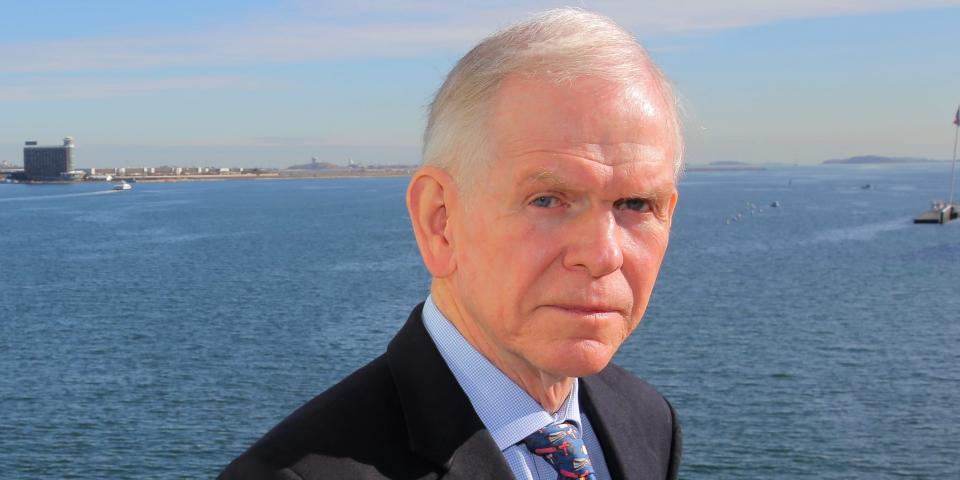Jeremy Grantham warned the 'everything bubble' is bursting, the S&P 500 could nosedive 50%, and a recession looks certain. Here are the elite investor's 12 best quotes from a recent interview.

Jeremy Grantham warned the S&P 500 could tank by up to 50% as the "everything bubble" bursts.
The GMO cofounder predicted a sweeping market decline and a harsh recession.
Grantham advised against holding US stocks for now, and slammed the Fed for inflating asset bubbles.
The S&P 500 could plunge by up to 50% as the "everything bubble" collapses, Jeremy Grantham told economist David Rosenberg during a recent Rosenberg Research webcast.
The prices of stocks, bonds, houses, fine art, and other assets soared to heady highs during the pandemic, paving the way for a historic crash and a painful recession, the market historian and GMO cofounder said.
Grantham blasted the Federal Reserve for inflating asset bubbles time and again, and warned investors against holding US stocks in the short run. He also wasn't surprised to see cracks in the system, such as the dramatic collapse of Silicon Valley Bank this month.
Here are Grantham's 12 best quotes from the interview, lightly edited for length and clarity:
1. "This one is pretty damn big. It's bigger than 2000, because it includes real estate and bonds, and that one did not. The economy had a gentle recession. It had no problem with real estate. It had no problem with markdown of debt. And yet, the Nasdaq went down 82%, Amazon went down 92%, and the S&P went down 50%. Be advised, this is not a gentle setback like 2000."
2. "It's bad enough just doing the equity market in 2000. This time, we have done a dead ringer for the equity market, plus for gravy, we've done the housing market and the bond market."
3. "The trouble with this bubble is it's an everything bubble. We have bubbled the important and dangerous housing market to record prices. We bubbled the bond market to levels that had never been seen in the history of man with the lowest rates ever recorded. Fine arts and every other asset through the roof, and equities, particularly in the US, at or close to the highest points ever reached."
4. "The big picture is we have a little handful of these super bubbles. Every one of them is followed by a recession. If you get anything really wrong, like 1929, it's followed by depression. If you mess around with the financial system, you have the terrible happenings of the Great Financial Crash."
5. "It's generally tough to get the market to go down between October 1st and the end of April, which is in six weeks' time. It's like the short sellers' graveyard. Then all bets are off, and back to the meat grinder." (Grantham explained that US presidents tend to stimulate the economy around the middle of their terms, to create a strong backdrop by the time of the next election.)
6. "We may settle for something like 3,000 on the S&P, all being well. If the extra factors bite pretty hard, then the market will go closer to 2,000. The economy is very likely to be quite a bit weaker, and profit margins are very likely to be lower. History is quite clear: There are bubbles, they have always broken, this one is breaking."
7. "The stresses build up like a huge pressure behind the dam, and you can't really work out which brick is going to go in the dam first. I'm surprised it was Silicon Valley Bank, but I am not surprised that there was something surprising like Silicon Valley Bank. I would have been surprised if nothing had cracked."
8. "When you write down perceived value by many trillions of dollars — and it will be more than $10 trillion by the end — and you've got multiple asset classes contributing, they all have consequences. And you should not be surprised if a chunk of the credit system comes under stress." (Grantham was describing the fallout from a massive collapse in asset prices.)
9. "In 2000, everybody was expensive. This time around, it's the US that's expensive and the rest of the world is not particularly expensive. Don't own short-term US equities. If you have to have US equities, then for heaven's sake, play the long game and do resources and climate change, and pretty well stay away from everything else."
10. "I don't think the bear market is likely to end until deep into next year. And the fundamentals could drag out for quite a while. But after April, we will probably begin to see pressure on profit margins, GDP growth, and the labor market."
11. "I hope it's well known by now that the Fed has never got anything right since Paul Volcker. They have merely created an environment conducive to a chain-linked series of super bubbles that break with outrageously consequential, painful effects."
12. "Nearly perfect economic conditions and profit margins. Investor confidence in full screaming blossom, where people are buying stocks because they're going up, and forgetting about fundamentals. Leverage has gone up a lot, and people have started to cheat and weasel more than normal, because they can. Ponzi schemes have taken root here and there." (Grantham was discussing how the the biggest asset bubbles form.)
Read the original article on Business Insider

